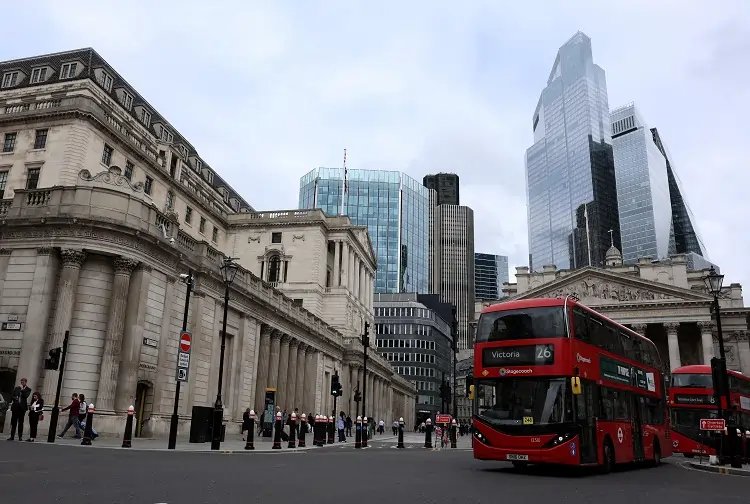Bank of England to cut Bank Rate to 4.75% on Nov. 7: Reuters poll


By Shaloo Shrivastava
BENGALURU (Reuters) – The Bank of England will cut its Bank Rate by a quarter-point on Nov. 7 to 4.75%, according to all 72 economists polled by Reuters, but a near-two-thirds majority expect no move in December, suggesting the BoE will stick to a cautious approach.
British inflation plunged to a three-year low of 1.7% in September from 2.2%, below the BoE’s 2% target. That leaves room for the Monetary Policy Committee (MPC) to cut rates next week after pausing in September following a narrow vote to start easing in August.
The British economy is still performing relatively well, with the prospect of an increase in investment from British finance minister Rachel Reeves’ budget due this week.
BoE Governor Andrew Bailey and MPC member Megan Greene welcomed the recent decline in inflation but downplayed its significance.
Another MPC member, Catherine Mann, said the cooling of price growth has “a long way to go”, suggesting a succession of cuts at each meeting may not yet be on the cards.
“Favourable inflation data in the interim between meetings has likely strengthened confidence among committee members that inflation is on a sustainable trajectory to target,” said Ellie Henderson, economist at Investec.
“We don’t think it will mean that the MPC will call victory on inflation just yet though… there are still some upside risks.”
All 72 economists in the poll taken Oct. 22-28 expected the BoE to cut the Bank Rate to 4.75% on Nov. 7.
Around two-thirds, 46 of 72, predicted no change at the next meeting in December. The rest expected another 25 basis point cut.
Among 16 Gilt-Edged Market Makers, a majority of 11 expected the MPC to hold rates in December, while five expected a cut. Interest rate futures are pricing in reductions in both November and December.
Even if the BoE opts to cut twice more this year, it would still be moving slower than its peers.
The U.S. Federal Reserve and the European Central Bank have cut interest rates by 50 and 75 basis points, respectively, and are both expected to have delivered a total of 100 basis points of cuts by year-end, compared with only 50 basis points from the BoE.
Median forecasts showed the Bank Rate at 3.50% by the end of 2025, slightly lower than the September survey. Views ranged between 4.25% and 2.75%, with no majority.
Asked about the greater risk to their end-2025 Bank Rate forecast, nearly 70%, 16 of 23, said it would be lower than they currently expect. The rest said higher.
Reeves will present her first budget on Oct. 30 and is expected to increase spending to improve services and upgrade Britain’s infrastructure.
The budget will not have much impact on UK inflation in the near-term said half the respondents, nine of 18, to an additional question. Seven said it might push inflation a bit higher and the remaining two said a bit lower.
Chancellor Reeves’ announcements will probably outline a strategy to raise taxes for increased day-to-day spending and borrow more for investment…This approach initially boosts demand and subsequently may increase supply, resulting in a looser fiscal stance,” said Stefan Koopman, senior market economist at Rabobank.
“That said, I think the Bank of England will indicate that the Budget will have a minimal net impact on the demand-supply balance, allowing them simply to remain on their path of gradual easing.”
Inflation was forecast to average 2.6% this year, 2.3% in 2025 and 2.0% in 2026. The UK economy was forecast to grow 1% this year, 1.3% next and 1.5% in 2026.
Those forecasts were broadly unchanged from the previous poll.
(Other stories from the Reuters global economic poll)
(Reporting by Shaloo Shrivastava; Polling by Mumal Rathore, Aman Kumar Soni and Renusri K; Editing by Ross Finley, Kirsten Donovan)
The Bank Rate is the interest rate at which a central bank lends money to commercial banks. It influences borrowing costs and economic activity.
Inflation is the rate at which the general level of prices for goods and services rises, eroding purchasing power.
The MPC is a committee within the Bank of England responsible for setting the Bank Rate and making decisions on monetary policy.
A basis point is a unit of measurement equal to one-hundredth of a percentage point, commonly used in finance to describe interest rate changes.
Explore more articles in the Banking category











